Looking to maximize the space in your mobile home? Ever considered adding a basement? Well, you’re not alone! The idea of having a basement in a mobile home might sound perplexing at first, but it’s actually becoming increasingly popular among homeowners.
Mobile Home Basement
Basements provide a shelter of possibilities, offering additional space and storage options that can greatly enhance the functionality of your mobile home. Whether you need extra room for guests or simply want to expand your living space, a basement can be a cost-effective solution. Not only does it add value to your property, but it also opens up endless opportunities for customization.
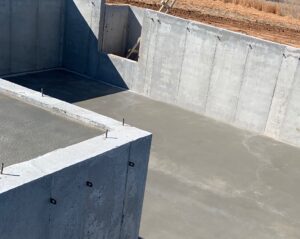
So why limit yourself? You can burst through the boundaries and create a living space that meets all your needs. Say goodbye to cramped quarters and hello to newfound freedom!
Remember: There’s no shortage of potential. Let’s dive deeper into this exciting concept and explore the benefits that await you!
Feasibility and Regulations of Adding a Basement to a Mobile Home
Adding a basement to your mobile home can provide additional living space and increase the value of your property. However, before embarking on such a project, it is crucial to consider the feasibility and understand the regulations involved. Here are some important factors to keep in mind:
Check Local Building Codes and Regulations
Before proceeding with any modifications, it is essential to check the local building codes and regulations in your area. Different regions may have specific requirements for adding basements to mobile homes. These regulations ensure that construction meets safety standards and does not pose any risks or hazards.
Consulting with Professionals
To assess the feasibility of adding a basement to your mobile home, it is advisable to consult with professionals who specialize in this type of construction. They will evaluate your specific location and mobile home structure, considering factors such as soil conditions, water table levels, and potential challenges that may arise during excavation.
Understanding Zoning Restrictions
Zoning restrictions play a significant role when considering the addition of a basement to your mobile home. Zoning laws dictate how land can be used within certain areas or districts. Some zones may permit basement additions while others may prohibit them altogether. It is crucial to understand these restrictions before proceeding with any plans.
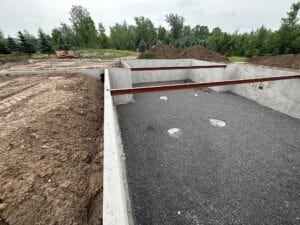
Compliance With Safety Standards
When planning for a basement addition in a mobile home, compliance with safety standards is paramount. This includes ensuring proper ventilation, adequate lighting, fire safety measures, and structural integrity. Working closely with professionals who are well-versed in these requirements will help ensure that all necessary precautions are taken.
While exploring the possibility of adding a basement to your mobile home, keep in mind that there are certain limitations associated with this type of modification. For instance:
The age and condition of your mobile home can impact its suitability for supporting additional weight from a basement.
The height clearance beneath your mobile home should be sufficient for excavation and construction.
Accessibility to utilities such as plumbing, electrical, and HVAC systems may require careful planning and coordination.
Advantages of Adding a Basement to a Mobile Home
Increased Storage Space for Better Organization and Decluttering
One of the major advantages of adding a basement to your mobile home is the significant increase in storage space it provides. Mobile homes often have limited storage options, which can lead to clutter and disorganization. By incorporating a basement, you gain ample room to store belongings that may not be frequently used, such as seasonal clothing, holiday decorations, or sports equipment.
With this extra storage capacity, you can finally bid farewell to the frustration of overcrowded closets and cramped living spaces. Imagine having designated areas for specific items, allowing you to easily locate what you need without rummaging through piles of clutter. A well-organized basement can bring a sense of orderliness and tidiness into your mobile home.
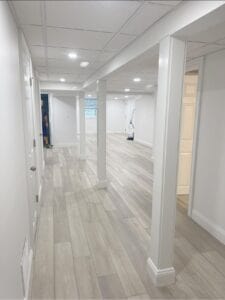
Additional Living Areas: Bedrooms, Offices, or Recreational Spaces
Beyond storage benefits, basements offer an exciting opportunity to create additional living areas within your mobile home. Whether you need an extra bedroom for guests or family members or desire a dedicated office space where you can work undisturbed, a basement provides the ideal solution.
You have the flexibility to transform this underground space into various functional rooms that suit your lifestyle and preferences. It could serve as a cozy guest suite complete with its own bathroom facilities or become a vibrant recreational area featuring a pool table, gaming consoles, or even a mini home theater setup. The possibilities are endless.
Improved Insulation and Energy Efficiency
Another advantage associated with having a basement in your mobile home is improved insulation and energy efficiency. Basements naturally provide better temperature regulation due to their location below ground level. This means they tend to stay cooler in hot weather and warmer during colder months compared to above-ground levels.
By harnessing these insulation properties effectively, you can reduce reliance on heating and cooling systems, thereby lowering your energy consumption and utility bills. A well-insulated basement can help maintain a more consistent indoor temperature throughout your entire mobile home, enhancing overall comfort for you and your family.
Enhanced Comfort and Livability
The addition of a basement to your mobile home introduces valuable square footage that enhances the overall comfort and livability of your space. It expands the usable area, offering room for various activities without encroaching on the main living areas.
Imagine having an inviting space where you can unwind after a long day or entertain friends and family. Your basement could be transformed into a cozy lounge area with plush seating options or even serve as a dedicated hobby room where you can pursue creative endeavors such as crafting or painting.
Moreover, this extra square footage allows for better furniture arrangement, ensuring an optimal flow within your mobile home. You can create distinct zones for different purposes while maintaining an open and spacious feel in the main living areas.
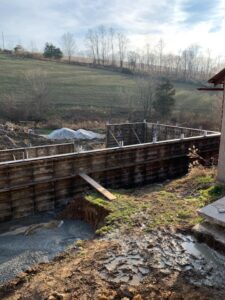
Step-by-Step Guide: Building a Basement for a Mobile Home
Obtain Necessary Permits
Before embarking on any construction work for your basement, it is crucial to obtain the necessary permits from local authorities. These permits ensure that your project complies with building codes and regulations, guaranteeing the safety of both you and your future mobile home.
Excavate the Area
Once you have obtained the required permits, it’s time to start excavating the area where you plan to build your basement. Use a skidsteer or similar equipment to remove soil and create space for your basement. During this process, pay close attention to proper drainage systems to prevent water accumulation in the future.
Construct Foundation Walls
The foundation walls are an integral part of any basement construction. They provide structural support for the weight of the mobile home above. When building these walls, it is essential to use durable materials that meet structural requirements. Consult with professionals if needed to ensure that your foundation walls are built correctly.
Finish off the Interior: Mobile Home Basement
After completing the construction of the basement structure, it’s time to focus on finishing off the interior according to personal preferences and needs. Here are some key aspects you should consider:
Insulation: Proper insulation is vital for maintaining a comfortable temperature inside your basement throughout the year.
Electrical Wiring: Hire a licensed electrician to handle all electrical wiring tasks, ensuring safety and compliance with electrical codes.
Plumbing: If you plan on having bathrooms or laundry facilities in your basement, consult with a plumber who can install plumbing fixtures correctly.
Flooring: Choose flooring options suitable for basements such as waterproof vinyl or tile that can withstand moisture.
By following these steps and considering personal preferences during each stage of construction, you can transform an empty space beneath your mobile home into a functional and comfortable living area.
Remember, before starting any construction work on your basement, always consult professionals when necessary and ensure compliance with local building codes. Safety should always be a top priority throughout the process.
So, if you’re looking to maximize your mobile home’s living space, don’t overlook the potential of a basement. With careful planning and execution, you can create an additional area that adds value and functionality to your home.
Considerations for Choosing the Right Foundation for Your Mobile Home Basement
Choosing the right foundation is crucial. The foundation not only provides structural support but also plays a vital role in preventing moisture issues and ensuring the longevity of your mobile home. Here are some key considerations to keep in mind when selecting the foundation type for your mobile home basement.
Evaluate different foundation options
Before making a decision, it’s important to evaluate different foundation options available for your mobile home basement. Two common choices are poured concrete walls and precast concrete panels.
Poured concrete walls: This traditional method involves pouring liquid concrete into formwork on-site, allowing it to harden and create a solid foundation wall. Poured concrete walls offer strength and durability, making them an excellent choice for supporting the weight of your mobile home.
Precast concrete panels: These are pre-made concrete panels that can be transported to your site and assembled together. Precast panels provide convenience and ease of installation while still offering adequate support for your mobile home basement.
The Right Factors for a Mobile Home Basement
Consider factors such as soil conditions, water table levels, and climate
Soil conditions, water table levels, and climate play significant roles in determining the best-fit foundation type for your mobile home basement. Here’s why these factors matter:
Soil conditions: Different soil types have varying load-bearing capacities. It’s essential to assess the stability of the soil beneath your mobile home to determine if additional reinforcement or special construction techniques are necessary.
Water table levels: The proximity of groundwater can impact the integrity of your basement’s foundation. If you have a high water table, you may need to consider waterproofing measures like installing drainage systems or using specialized materials.
Climate: Extreme weather conditions can affect the stability of foundations over time. For example, freeze-thaw cycles can cause shifting or cracking in certain types of foundations. Understanding how climate factors may impact your foundation choice is crucial for long-term durability.
Consult with a Professional: Mobile Home Basement
Consult with professionals to assess load-bearing capacity and structural requirements
To ensure the chosen foundation type can adequately support the weight of your mobile home, it’s essential to consult with professionals. They can assess the load-bearing capacity of different foundation options and determine which one aligns best with your mobile home’s structural requirements.
Ensure proper waterproofing measures are taken
Basements are prone to moisture issues, so it’s vital to take proper waterproofing measures. This includes:
Installing a reliable drainage system: A well-designed drainage system will help divert water away from your basement walls and prevent water buildup.
Applying waterproof coatings: Coating the interior and exterior surfaces of your foundation walls with a waterproof sealant can provide an additional layer of protection against moisture intrusion.
Insulating properly: Proper insulation not only helps regulate temperature but also prevents condensation buildup within the basement, reducing the risk of mold or mildew growth.
You might also be interested in our article: Water Leak Under a Mobile Home
Exploring the Cost and Return on Investment of Adding a Basement to a Mobile Home
Adding a basement to a mobile home can be an exciting project that not only expands your living space but also potentially increases the value of your property. However, it’s important to consider the cost and return on investment before diving into this endeavor.
The cost of adding a basement to a mobile home can vary depending on several factors. The size of the basement, materials used, and labor costs all play a significant role in determining the overall expense. Excavation is one of the major expenses involved in this project, as it requires digging out the area where the basement will be located. Construction costs for foundations, walls, flooring, and finishing touches should be taken into account when budgeting for this undertaking.
Mobile Home Basement: Cost Effectiveness
When evaluating the cost-effectiveness of adding a basement to your mobile home, it’s crucial to consider potential return on investment. While you may incur upfront expenses for this project, it could significantly increase your property’s value in the long run. Basements are highly desirable features for many homebuyers as they provide additional living space and storage options. By investing in a basement addition, you could potentially attract more buyers if you decide to sell your mobile home in the future.
Proper budgeting is essential when tackling such an extensive project. To manage expenses effectively, create a detailed plan that outlines all aspects of the basement addition. Research local real estate market trends to understand how adding a basement may impact resale value in your area. This information will help you determine whether investing in this project aligns with your financial goals.
Here are some key considerations when budgeting for adding a basement to your mobile home:
Excavation: Obtain quotes from contractors experienced in excavating basements specifically for mobile homes.
Construction: Research different construction methods suitable for mobile homes and compare costs.
Permits: Check with local authorities to determine if any permits or inspections are required for the basement addition.
Finishing touches: Consider the cost of insulation, electrical work, plumbing, and flooring to complete the basement.
By carefully considering these factors and budgeting accordingly, you can ensure that your basement addition project stays within financial boundaries while maximizing its potential return on investment.
You might be interested in our article: Crawl Space Encapsulation 5 Reasons Its a Good Idea
Comparing Permanent Basements to Other Storage Options for Mobile Homes
Permanent basements offer more space and versatility compared to other storage options like sheds or garages for mobile homes. Basements are the way to go. With a permanent basement, you have the advantage of utilizing the vertical space beneath your mobile home, giving you ample room for storing belongings.
Unlike external storage options, basements provide protection against weather elements and theft risks for stored belongings in mobile homes. Imagine having all your valuable possessions safe and secure within your reach. A basement ensures that your items are shielded from rain, snow, and extreme heat. With belongings tucked away inside the basement, there is a reduced risk of theft compared to leaving them exposed in an external shed or garage.
A permanent basement allows easy access from within the mobile home itself, eliminating the need to go outside during inclement weather or at night. This convenience saves you time and effort when retrieving or storing items. Instead of braving harsh weather conditions just to grab something from an outdoor shed, you can access your basement without stepping foot outside.
Mobile Home Basements: Better Temperature Regulation
Basements offer better temperature regulation compared to external storage units that may be subject to extreme heat or cold. The insulation provided by the surrounding earth helps maintain a more stable temperature within the basement. This is especially beneficial if you have sensitive items such as electronics or delicate furniture that can be damaged by extreme temperatures.
In addition to these advantages, basements provide additional benefits such as:
Storage: Basements offer plenty of space for storing seasonal items like holiday decorations or sporting equipment.
Space: By utilizing the vertical space below your mobile home, a basement allows you to free up valuable real estate on your lot.
Time: With everything neatly organized in your basement, you save time searching through cluttered sheds or garages.
Lot: Unlike sheds or garages, basements don’t take up additional space on your lot. This is especially beneficial if you have limited land available.
Way: The basement acts as a dedicated storage area, ensuring that your belongings are always in one place and easily accessible.
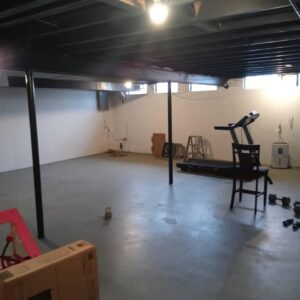
Conclusion: Mobile Home Basement
In conclusion, adding a permanent basement to your mobile home can greatly enhance its functionality and value. By following the necessary regulations and considering the feasibility of such a project, you can create additional space for storage, living areas, or even recreational purposes.
The advantages of adding a basement to your mobile home are numerous. Not only does it provide extra square footage, but it also allows for better organization and utilization of space. With a step-by-step guide, building a basement becomes an achievable task that can be customized to meet your specific needs.
Choosing the right foundation for your mobile home basement is crucial. Factors such as soil conditions, climate, and budget should all be taken into consideration to ensure stability and longevity. By exploring the costs involved and potential return on investment, you can make an informed decision about whether this addition is right for you.
When comparing permanent basements to other storage options for mobile homes, it becomes clear that they offer unparalleled benefits. Unlike external sheds or garages, basements provide protection from the elements while maximizing available space within your property.
To further illustrate the value of adding a basement to your mobile home, consider real-life examples and case studies that showcase successful transformations. These stories demonstrate how this investment can not only improve daily living but also increase property resale value in the long run.
In order to make an informed decision about adding a permanent basement to your mobile home, it is important to assess any potential concerns or questions you may have. Here are some frequently asked questions:
FAQs: Mobile Home Basement
Q: Will adding a basement impact my mobile home’s structural integrity?
A: When done correctly following regulations and guidelines, adding a basement should not compromise the structural integrity of your mobile home.
Q: How long does it take to build a basement for a mobile home?
A: The duration of construction will vary based on factors such as size, complexity, and weather conditions. It is best to consult with professionals for a more accurate estimate.
Q: Can I use the basement as living space?
A: Absolutely! Once the basement is completed, it can be utilized as additional living space, such as bedrooms, recreational areas, or even an office.
Q: How much does it cost to add a basement to a mobile home?
A: The cost will depend on various factors, including size, materials used, and labor. Obtaining quotes from contractors will give you a better idea of the specific costs involved.
Q: Will adding a basement increase my property value?
A: Yes, adding a permanent basement can significantly increase your mobile home’s resale value by providing additional square footage and functionality.
You might also be interested in our articles:
Discover Your Mobile Home Wind Zone

